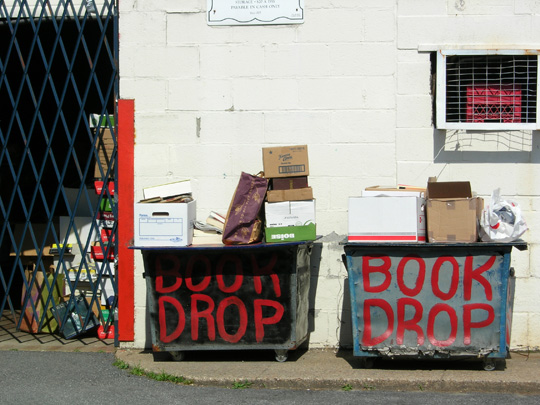 In the 1990s, Baltimore was "The City That Reads." This optimistic statement, found mostly on bus stops and benches, was replaced about ten years later by "The Greatest City In America." Big talk, yet Baltimore’s greatness lies arguably in its quirkiness, a truly fine example of what is The Book Thing of Baltimore . Its mission is "to put unwanted books into the hands of those who want them." How do they do it? The books are free! Donations from libraries, publishers, reviewers, authors, illustrators, and everyday people have given The Book Thing a collection of some 200,000 books on average. Aside from volunteers, who are always welcome to show up unannounced during store hours, The Book Thing is managed by Russell Wattenberg, a 29-year-old Brooklyn native and former bartender who used to hear schoolteachers complain that students didn’t have enough books. When Wattenberg started buying them books with tip money, people started to take notice and donated their own books. At some point it became apparent that the operation, which started in his basement, needed to expand. The store hands out about 10,000 books a week to a wide range of customers, from university professors to homeless people. The Book Thing accepts all books, regardless of age or subject matter. Wattenberg believes that if there’s a book, there’s someone who wants it. The Book Thing is open 9 am to 6 pm Saturdays and Sundays. Donations can be made any day of the week via two drop off bins that sit outside.
In the 1990s, Baltimore was "The City That Reads." This optimistic statement, found mostly on bus stops and benches, was replaced about ten years later by "The Greatest City In America." Big talk, yet Baltimore’s greatness lies arguably in its quirkiness, a truly fine example of what is The Book Thing of Baltimore . Its mission is "to put unwanted books into the hands of those who want them." How do they do it? The books are free! Donations from libraries, publishers, reviewers, authors, illustrators, and everyday people have given The Book Thing a collection of some 200,000 books on average. Aside from volunteers, who are always welcome to show up unannounced during store hours, The Book Thing is managed by Russell Wattenberg, a 29-year-old Brooklyn native and former bartender who used to hear schoolteachers complain that students didn’t have enough books. When Wattenberg started buying them books with tip money, people started to take notice and donated their own books. At some point it became apparent that the operation, which started in his basement, needed to expand. The store hands out about 10,000 books a week to a wide range of customers, from university professors to homeless people. The Book Thing accepts all books, regardless of age or subject matter. Wattenberg believes that if there’s a book, there’s someone who wants it. The Book Thing is open 9 am to 6 pm Saturdays and Sundays. Donations can be made any day of the week via two drop off bins that sit outside.
 CDM-eCycling is short for Computer Donation Management which specializes in recycling and refurbishing electronic equipment. The company occupies a 104,000 square foot warehouse in southwest Baltimore and recycled 9.5 million pounds of trash just last year. Bob Donald, who is an engineer by training and Co-Founder of eCycling remarks, ” We’ll take anything that has a cord or a battery,” hesitates and then says, “except cars”. With 10 years strong in electronic recycling Bob, also mentions that the only part of an electronic device that couldn’t be recycled is the particleboard used in some older TV models. This waste is then sent down the street to the Bresco plant. eCycle has 6 facilities, all of which partner with non-profits in providing a percentage of their refurbished electronics to small communities in less developed countries. The facility has 97 employees, ninety percent have disabilities or are ex-offenders. Each employee is paid well above minimum wage with benefits and after having visited the warehouse myself each is placed with great care by a professional industrial psychologist to best match their strongest skill with a corresponding task. Most of eCycles product comes from federal and state run organization in Maryland, including parts of Delaware, Pennsylvania, Virginia and North Carolina. They also have relationships with McCormick Spice who supply them with sorting boxes which, would other wise get thrown out. While walking passed one on my tour I caught a whiff of what smelled like fresh garlic!
CDM-eCycling is short for Computer Donation Management which specializes in recycling and refurbishing electronic equipment. The company occupies a 104,000 square foot warehouse in southwest Baltimore and recycled 9.5 million pounds of trash just last year. Bob Donald, who is an engineer by training and Co-Founder of eCycling remarks, ” We’ll take anything that has a cord or a battery,” hesitates and then says, “except cars”. With 10 years strong in electronic recycling Bob, also mentions that the only part of an electronic device that couldn’t be recycled is the particleboard used in some older TV models. This waste is then sent down the street to the Bresco plant. eCycle has 6 facilities, all of which partner with non-profits in providing a percentage of their refurbished electronics to small communities in less developed countries. The facility has 97 employees, ninety percent have disabilities or are ex-offenders. Each employee is paid well above minimum wage with benefits and after having visited the warehouse myself each is placed with great care by a professional industrial psychologist to best match their strongest skill with a corresponding task. Most of eCycles product comes from federal and state run organization in Maryland, including parts of Delaware, Pennsylvania, Virginia and North Carolina. They also have relationships with McCormick Spice who supply them with sorting boxes which, would other wise get thrown out. While walking passed one on my tour I caught a whiff of what smelled like fresh garlic!
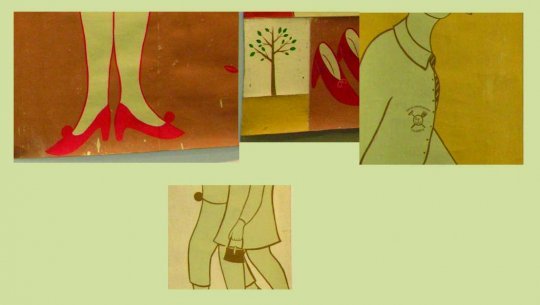 The Baltimore Free Store is a non-for-profit all volunteer organization founded on principles of social justice. It encourages recycling and reuse in hopes of decreasing poverty and fostering cooperation in achieving a community’s needs. They ask "take what you want, and give what you can" with the goal of empowering communities to organize and meet their needs independently. Beyond this wonderful community oriented concept of recycling and reuse, The Free Store is beginning an initiative to encourage residents to go greener. So take what you want and be sure to give what you can.
The Baltimore Free Store is a non-for-profit all volunteer organization founded on principles of social justice. It encourages recycling and reuse in hopes of decreasing poverty and fostering cooperation in achieving a community’s needs. They ask "take what you want, and give what you can" with the goal of empowering communities to organize and meet their needs independently. Beyond this wonderful community oriented concept of recycling and reuse, The Free Store is beginning an initiative to encourage residents to go greener. So take what you want and be sure to give what you can.
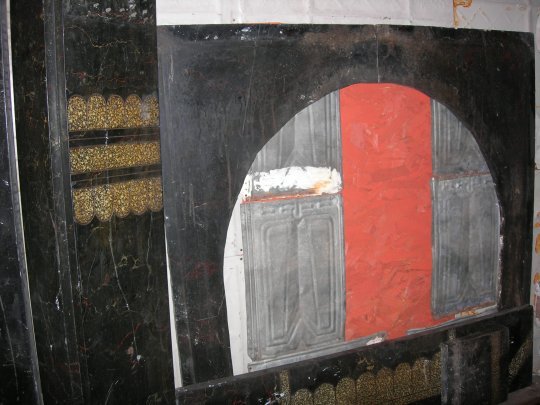
Opened in 1984 as the first non-profit program of its kind in the nation, The Loading Dock, Inc. is a Baltimore-based, non-profit, low-cost building materials reuse center. Its mission is "to increase the supply and use of affordable building materials for housing and community improvement by redirecting landfill-bound, reusable materials into productive use." Since its beginning, The Loading Dock has saved low-income housing and community projects over $16.5 million and has rescued over 33,000 tons of building materials from landfills. As they accept just about all kinds of materials, visit their website to find out what’s in stock and see a workshop schedule. Get a listing of other salvage and reuse centers including Maryland, Pennsylvania Virginia and DC on their website .
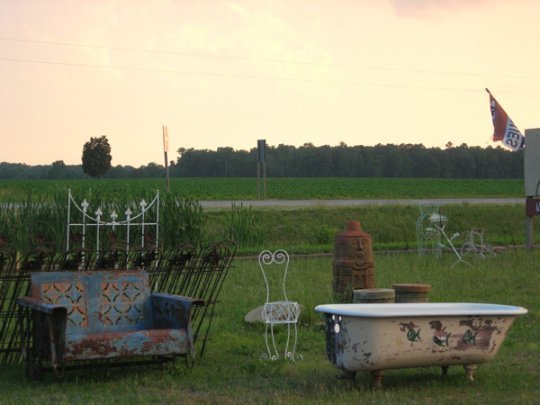
Working with local and regional architects, builders, and contractors, Second Chance rescues wood, metal, marble, plaster, stone, and other architectural elements from buildings which are entering the demolition phase. They then give those elements new lives, in new homes, in new ways, with new uses, giving modern homes a touch of history. Through public and private funds, they continue to train low-income Baltimore residents on how to safely deconstruct a building without damaging its historic elements, while also equipping them with a variety of skills, from carpentry to craftsmanship. Visit their website for more information on the company, its events, and training opportunities. Find more salvage centers in the surrounding area here.
 In the 1990s, Baltimore was "The City That Reads." This optimistic statement, found mostly on bus stops and benches, was replaced about ten years later by "The Greatest City In America." Big talk, yet Baltimore’s greatness lies arguably in its quirkiness, a truly fine example of what is The Book Thing of Baltimore . Its mission is "to put unwanted books into the hands of those who want them." How do they do it? The books are free! Donations from libraries, publishers, reviewers, authors, illustrators, and everyday people have given The Book Thing a collection of some 200,000 books on average. Aside from volunteers, who are always welcome to show up unannounced during store hours, The Book Thing is managed by Russell Wattenberg, a 29-year-old Brooklyn native and former bartender who used to hear schoolteachers complain that students didn’t have enough books. When Wattenberg started buying them books with tip money, people started to take notice and donated their own books. At some point it became apparent that the operation, which started in his basement, needed to expand. The store hands out about 10,000 books a week to a wide range of customers, from university professors to homeless people. The Book Thing accepts all books, regardless of age or subject matter. Wattenberg believes that if there’s a book, there’s someone who wants it. The Book Thing is open 9 am to 6 pm Saturdays and Sundays. Donations can be made any day of the week via two drop off bins that sit outside.
In the 1990s, Baltimore was "The City That Reads." This optimistic statement, found mostly on bus stops and benches, was replaced about ten years later by "The Greatest City In America." Big talk, yet Baltimore’s greatness lies arguably in its quirkiness, a truly fine example of what is The Book Thing of Baltimore . Its mission is "to put unwanted books into the hands of those who want them." How do they do it? The books are free! Donations from libraries, publishers, reviewers, authors, illustrators, and everyday people have given The Book Thing a collection of some 200,000 books on average. Aside from volunteers, who are always welcome to show up unannounced during store hours, The Book Thing is managed by Russell Wattenberg, a 29-year-old Brooklyn native and former bartender who used to hear schoolteachers complain that students didn’t have enough books. When Wattenberg started buying them books with tip money, people started to take notice and donated their own books. At some point it became apparent that the operation, which started in his basement, needed to expand. The store hands out about 10,000 books a week to a wide range of customers, from university professors to homeless people. The Book Thing accepts all books, regardless of age or subject matter. Wattenberg believes that if there’s a book, there’s someone who wants it. The Book Thing is open 9 am to 6 pm Saturdays and Sundays. Donations can be made any day of the week via two drop off bins that sit outside.

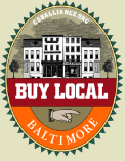


 View the dynamic, moving GOforChange: Greening Baltimore video
View the dynamic, moving GOforChange: Greening Baltimore video




